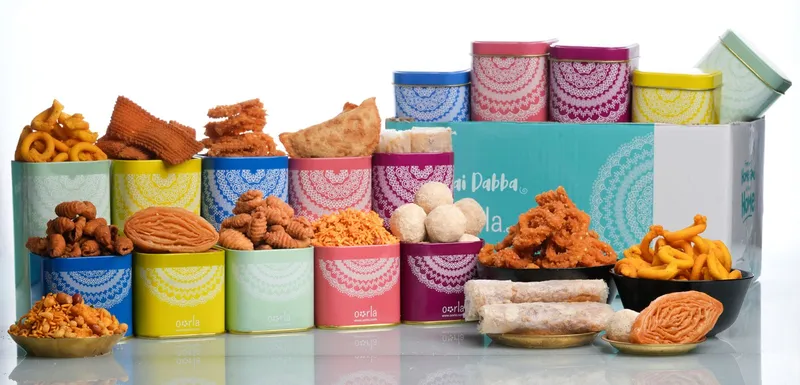Coimbatore-based Oorla is bringing authentic South Indian sweets and snacks to a global audience
Started in 2021, Coimbatore-based Oorla has dispatched over 50,000 orders for authentic South Indian snacks and sweets and aims to expand to other regions. Here's how.
Earlier this month, , a sweets and savoury brand from Coimbatore, exhibited its products in Denver, Colorado. On display, among many other traditional South Indian delicacies, was Thenga Mithai—a kind of coconut barfi (sweet) native to Tamil Nadu’s Karur city.
Visitors, most of whom were from India, said the product lineup made them feel nostalgic about the time they spent back home.
For Co-founders Saravana Kumar Mohanraj, Prabhakaran Balasundharam, Arvindh Saravana Bhavan, this vote of approval makes their journey to entrepreneurship, which began in 2021, a success.
The idea to bring regional South Indian delicacies to a global market, Mohanraj says, was by Gayathri Devi Ganesan, who resides in the US and joined forces with the trio to initiate business operations.
“It was during Diwali of 2021 when we dispatched our first product to Texas. It was a combo of 10 different South Indian sweets and savouries which we had handpicked from vendors of different regions. It was a hit and within 30 days, we were able to dispatch around 850 orders and that was our beginning,” Mohanraj recalls.
Mohanraj says that currently Tirunelveli Halwa, Chennai Dum Ka Roat Halwa, Kayalpattinam Coconut Oil Mixture, Srivilliputhur Palkova are among its bestsellers.
Oorla has dispatched over 50,000 orders so far. The company says it will likely close FY24 with a revenue of Rs 14 crore and that it has been profitable since the beginning.
So, how did the journey start?
“It was us boys handpicking products, packing and dispatching,” says Mohanraj.
Beginning of Oorla
In its initial days, Oorla received orders via social media advertisements the co-founders created and ran. Mohanraj says the brand soon started getting popular through word-of-mouth, which resulted in orders from both local as well as customers in the US.
The co-founders say that in the beginning, they selected a variety of snacks and savouries from well-known shops or families renowned for crafting authentic cuisines.
While this process was manual and time-consuming, Mohanraj says it helped the brand build connections with local businesses and customers.

Oorla's range of products
When Oorla entered the market, it faced competition from established players like Sweet Karam Coffee, which secured a $1.5 million investment from Fireside Ventures last year, as well as companies such as Adukale and The State Plate. According to a report by IMARC Group, the Indian snacks market size was Rs 42,695 crore in 2023 and is expected to reach Rs 95,522 crore by 2032, exhibiting a CAGR of 9.08% during the forecast period.
However, according to Mohanraj, Oorla sets itself apart by specialising in Andhra, Telugu, and Tamil cuisine. Unlike competitors who primarily target the South Indian snacks and savouries market, Oorla aims to source products from other parts of India.
While acknowledging that other companies export their products, Mohanraj emphasises Oorla has always focussed on exporting its products—it currently sells products in over 50 countries. And this focus on overseas markets sets it apart from its competitors.
Oorla has so far partnered with more than 30 vendors for its products. To maintain quality standards, the company tests its products at a lab in Coimbatore.
So, how does Oorla dispatch sweets meant to be consumed within days of manufacturing?
Mohanraj explains that all the products are made-to-order and some of the vendors exclusively make for Oorla. Typically, the company reaches out to vendors who can supply the products within 24 to 48 hours. Post this, the items are packed and dispatched to customers within three to five working days.
“We want to sell any item from its origin and there is a proper shelf life to it. We don’t keep products that cannot last for seven to 10 days,” Mohanraj explains.
Challenges and the way forward
According to Mohanraj, the company ensures that it solves customers’ queries in real time. “This increases the trust factor of customers who are miles away but still connected and this enhances brand value,” Mohanraj tells SMBStory.
However, logistics remains the biggest challenge for Oorla. Mohanraj says that since every country has its own regulations regarding food, which the company is still trying to navigate.
Talking about the future, Mohanraj says that the company aims to expand its offering by moving beyond South India and including Western, Eastern, and Northern specialties in its product lineup. The company is also planning to bring more verticals and has recently expanded to offering sarees as well.
Currently, with the presence of brands such as Shobitam, Mysore Saree Udyog, and Kalki Fashion in the market, Mohanraj asserts that Oorla has successfully gained the trust of customers by providing native sarees. He believes that this established trust will extend to other product categories, paving the way for the brand and business to flourish.
Edited by Affirunisa Kankudti







